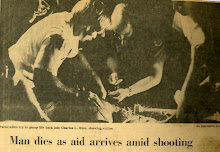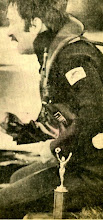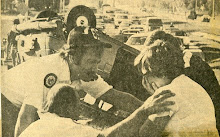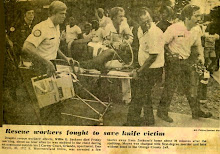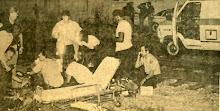This is a great little documentary about the early days of EMS. If you can stand some of the editorial comments and it is slow at times it is a real look back. I became a EMT in 1974 and a paramedic in 1977. The names of the physicians and early programs were considered cutting edge. I think it is important to understand how far we have come since those years. I had forgotten just how controversial it all was in the beginning.
Wednesday, September 30, 2009
Tuesday, September 29, 2009
The Twenty Percent Rule
A doctor once told me that 40% of the patients I would see in EMS would die no matter what I did, another 40% of the patients would live no matter what I did, but there would be 20% where what I did would make a difference. He told me to hold on to that 20% because it was all you were going to get and it would have to be enough.
Monday, September 28, 2009
What Separates Us
A fire station is a unique environment. It is connected to the nervous system of the community it serves. A nervous system that finds every trash fire, car fire, house fire, woman not breathing, child hit my a car, accident with injuries, shooting, stabbing, overdose, difficulty breathing, drowning, cardiac, asthma attack and every other type of personal disaster imaginable. It exists outside the bubble of safety that it helps create for everyone else. When we walk into the station we become part of the nervous system. We become part of all the bad things that happen in our community. We gain knowledge that few outside the station understand exists.
Even if it is not your call, there is this constant litany of emergencies over the radio as other units are dispatched. We stand in the open bay doors and watch children play and ride their bikes in front of the station, while you are listening to units at a shooting on the west side of town. Or you are having breakfast as Engine 6 and Rescue 6 have a woman not breathing. You are cleaning the truck as Engine 2 and Rescue 2 have a stabbing. Then your tones go off and you have your own emergency to manage.
Civilians are the people who live that bubble. That sphere of safety created by us in stations across the city. The bubble where they went to work, ate, slept and played and nobody got hurt or died. Where they felt safe and secure knowing that help is only a phone call away no matter what the emergency. Where they could walk around and not worry about anything except what their own self interest, because when that bubble burst they knew that with a simple phone call we would come and fix whatever was wrong. Our job was to create the bubble and when it burst it was up to us to try to put it back together.
So while we sit in the station in the midst of all of the peace and quite of the neighborhood around us, we are part of this nervous system. We are no longer part of the peaceful world. We are part of the nervous system that can jerk us into the midst of any emergency imaginable. Our job is to create a perceived bubble of safety for our community that protects it no matter what happens. No matter how bad the situation we respond and try and put the pieces back together so people can feel safe again. Can feel protected again. Our job is to try to keep the bubble intact.
When we go to work somebody usually dies, maybe not in fire but in small ways like the auto accident, the drowning, the cardiac, the shooting, the stabbing, or just the end of living a good long life. But somebody died, we live in a world where the unthinkable can and does happen, a world where people die sudden and sometimes ugly deaths. They all had lives and they were over now. Where things are not nice and neat. Where life seems to leave a lot of loose ends. Loose ends that most people only deal with once or twice in a lifetime if they are lucky. These small personal tragedies are our job.
So we enter the real world where actions had terrible consequences. We live with a profound truth that had been lost in our modern society, that death is very near to all of us and it doesn’t take much to cross that line. The great “they” have forgotten it. Modern society seems to try and convince everyone that death is somehow this unusual event. This news-making story of horror. Death is in all our futures in one-way or another. No amount of exercise, diet, drugs or laws will change that ending. Yet in today’s society everyone is so shocked when death does come close.
The nightly news anchors always frown and show concern when they report one of our incidents before moving on to the next story. Secure in the knowledge something so terrible could not happen to them, because they occupy the most protected part of sphere that money, fame and privilege provides. But when it happens to one of them watch their faces. Everything is more real to them. Suddenly it could happen to them and people they know it. But those of us who climb onto the trucks, we have the knowledge. We know how close it is. We think we are smart enough, tough enough and lucky enough to dodge the chances we take on the job long enough to die peacefully in bed.
Because we take that knowledge away from the station, we live with it everyday, it is ground into us. We see life through this new prism. When we walk down the street, go to the beach, go out to eat, we see things that others don’t. We walk in the sphere with the others, but we are always looking for the cracks or leaks that if you are not careful, could make you an accident victim.
We feel separate and apart from those without the knowledge. It is why we spend so many of our off hours with one another. No one else understands. When we tell a story the other guys laugh when they should and shake their heads when they should. It can put up a permanent wall if you let it. This reality pushes you from other people. Friends ask “What happened lately? Do you have any good stories?” But to us, these people are not just stories. They are people who bleed. Who cry. Who die. So you answer “Ah, nothing much happened.” Because when we tell a story if it is for the vicarious thrill of somebody, it diminishes the pain of the victim and our efforts.
What we did is not a story. What we did was a desperate attempt to beat back the inevitable in many cases. But it is our job to try. Certain events stuck in our mind the way signposts draw you attention on the Interstate. They are turning points. Point of reference. Many times they are turning points in our own lives. What we did. What we saw. What we heard. What we tried to do. How we tried to help sometimes can fundamentally change who we are, and how we view the world. And yet none of these events make the headlines. They are the little articles on page two in the local section of the paper, but we carry it around with us each day for the rest of our lives. It separates us from those around us who don't have the knowledge who don't understand. It is the reason that even after thirty years when I see someone I served with we shake hands, smile and ask how they are doing, but there is always a moment that we exchange a glance, a recognition of someone else who knows, who understands, who has the knowledge. The knowing makes us part of a brotherhood. A brotherhood that separates us from those around us and places us the outside the bubble we created.
Thursday, September 17, 2009
Memories
I hear the sirens and air horns now, especially the air horns. Not every time I hear them, but sometimes. Suddenly I am back on the trucks. Pulling on my bunker gear. Looking up a street on the map. Shouldering the straps to my air tank. Pulling up my three quarter boots. Putting on my gloves. I am back in it. I am back on the street. I can almost hear the radio traffic.
“Engine 1, Engine 51, Tower 1, Rescue 1, District 1 house fire….”
“Engine 7, Rescue 7 shooting. OPD is not on the scene….”
“Rescue 1, Rescue Boat 1 respond to assist Engine 7 and Rescue 7 with a drowning….”
“Engine 6, Engine 4,Crash 6, Rescue 6, Tower 1, District 1 plane down…”
“Engine 3, Rescue 3 person not breathing…”
“Engine 10, Tower 10, Rescue 7 District 2 accident with injuries involving entrapment…”
I can almost feel the adrenaline rush. See the red lights of the trucks. Hear the roar of the diesel. Then dispatch would give the report that always meant you had something serious.
“We are receiving multiple calls.”
“We have reports of people trapped.”
“CPR is being performed.”
Then I find myself listening for the reports from the first units to arrive.
“Engine 1 to dispatch we have heavy fire showing from a single story wood frame structure. We are pulling an inch and three quarter line.”
“Engine 6 to Orlando we have a single engine plane down in a tree. No fire. But we do have a fuel leak. Be advised the passenger and the pilot are trapped.”
I am back on the street. That mystical place I named so long ago, the other reality that exists just outside most people’s everyday work a day lives. It is a place that seems to exist in parallel to daily existence. Yet it is only a car accident or cardiac away for everyone.
The street was more than a physical place. It was a place where all of the safe guards end, and my job begin. It is a place filled with excitement, fear, tragedy, horror, sadness, despair, joy, and laughter. It was a place where everyday decisions had terrible consequences. I am going to the grocery store, or I will fix the wiring fixed next month. Where people died or were horribly injured because of these simple daily decisions. It was terrible place, or maybe it is reality. It was where I worked.
The street existed in the poorest homes in Orlando, and in the richest. It existed in back alleys and the main streets. It existed in brush fires, house fires, shooting, stabbings, hangings, cardiac’s, codes, drowning’s, and a thousand other emergencies. It was everywhere. I have houses or intersections that had been scenes and now were signposts in my life. That house is where I pulled the woman out of the fire that afternoon. I pass the intersection where all those people died on that Thanksgiving night when I go to the YMCA. I can see where I had the double shooting from the East/West Expressway. I can see where we tried to save a mother and three children that night in that fire, each time I get on the interstate. Across the street from those apartments is where we found that body that had been undiscovered for three days in the Florida heat. The reminders of the street and the years I spent on it are everywhere around me, like some kind of map of my life. A map that marks life-changing event for me and those I tried to help. Even now, thirty years later, the memories they produce are as strong as ever.
